Traveling With Marijuana
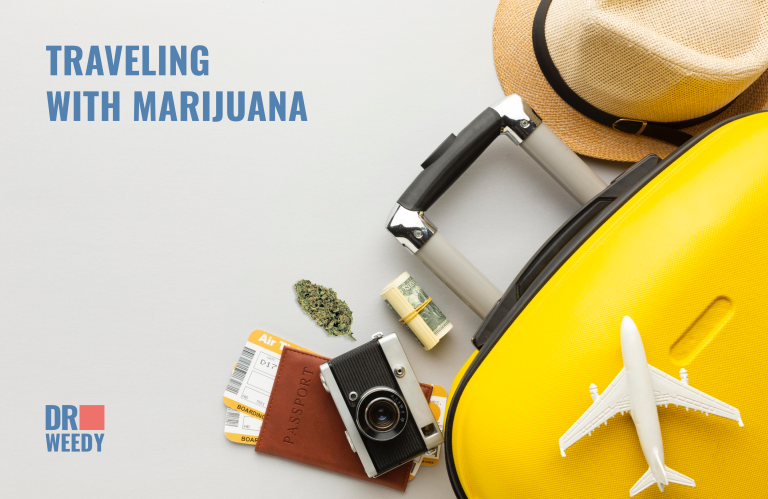
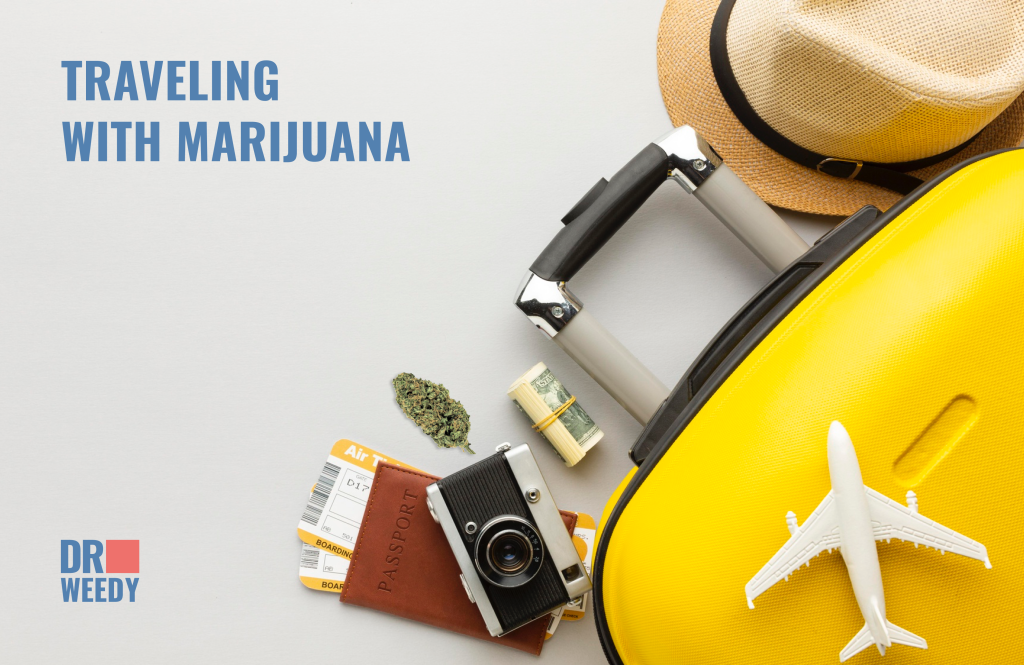
Is There Something You Haven’t Known About Traveling With Marijuana?
No one is a stranger to marijuana. It is regarded as the most used federally illegal drug. As a medicine, it has benefited a lot of people in so many ways. You may have probably used it or one of its popular products, CBD oil. With the legalization of marijuana in many states, it has become increasingly popular amongst adults in the US. However, despite the popularity of this medicine, its status in many states is still pretty controversial.
The United States Department of Justice published an update to its marijuana enforcement strategy in August 2013, stating that while cannabis remains illegal federally, states are encouraged to develop “strong, state-based enforcement initiatives.” The agency also maintains the authority to sue the states whenever it deems it appropriate.
Surveys in the US society have shown that almost half of the American adult population has used marijuana at least once in a lifetime. These people cannot be named constant users, but the population of regular users grows in geometrical progression. You must understand that despite the credibility of the government surveys, many of the surveyed adults may have hidden the fact of marijuana usage because it’s illegal in many states.
Since marijuana has yet to become fully legal throughout the US, it is not wise to travel without knowing the basics. Many hidden aspects should be discussed to prevent some negative consequences. To avoid inconveniences or worse problems, it becomes crucial for every marijuana user to be fully acquainted with the necessary guidelines before traveling with marijuana.
So if you are searching for a comprehensive guide on traveling with weed across state lines, this article is here to answer all your questions.
What does the law say?
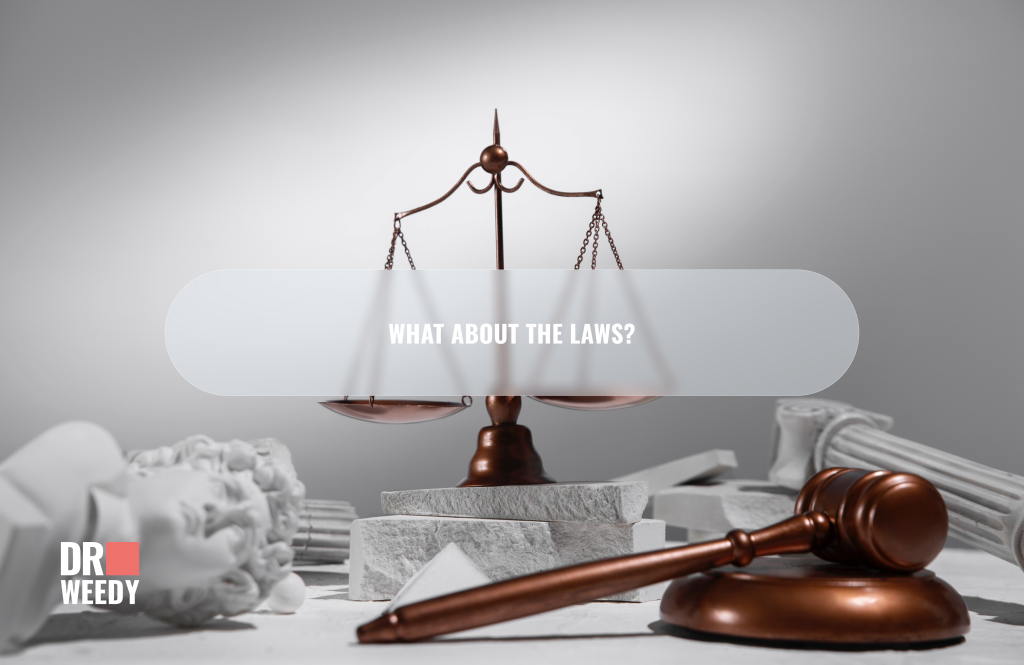
With marijuana being legal for adults in 21 states, including Washington, DC, and medicinal marijuana authorized in 38 states, including DC, you’d assume that traveling with marijuana is no longer a problem, but unfortunately, this is not the case.
Although marijuana is legalized in many states, it cannot be used as you please because it is still treated as a controlled substance in the class of heroin and cocaine by federal law. Cannabis is still, at the moment, a controlled substance that may result in problems if moved across state lines. As a matter of fact, there is a chance that the usage of marijuana might be considered a breakage of federal laws and therefore considered a crime.
The federal law issued back in 1930 treats marijuana as a controlled substance. It prohibits the usage, sale, and distribution of marijuana. The current federal law is listed in the Controlled Substance Act (CSA). It reviews drugs according to their medical value and potential drug abuse. Even though you’re not involved in the marijuana industry and propose your services for businesses that operate under federal marijuana laws, you might be prosecuted. The minimum charge might be at least one thousand dollars or at least one year of imprisonment for “distribution and selling of controlled substances,” which is a disappointing fact. Understanding the US state’s medical cannabis law will also give you an upper hand. The best thing you can then do for yourself is to get well acquainted with the local laws of the state or country you’re going to travel to.
Can you fly with weed?
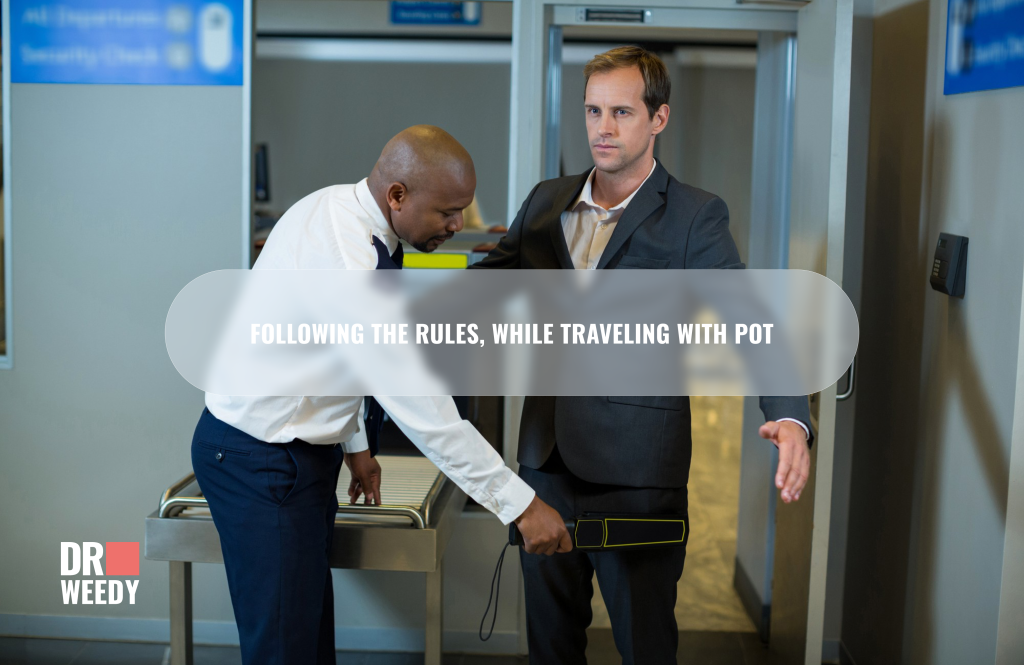
Well, the short answer is No even despite Biden’s new directive. As the federal law governs airplane travel in the USA. But in real life federal laws and the Department of Transportation, along with the Federal Aviation Administration, work together to determine your eligibility to fly with marijuana. So local laws matter.
Transportation Security Administration (widely known as TSA) security officers don’t have a specific task to search for marijuana in your bag, but when it is found in possession of passengers, the TSA officer is mandated to report anyone found to be in possession of marijuana to the local airport security whether it is legal in the state or not. Should this happen, the issue will be reviewed by the local state law enforcement officer, most likely using the local state regulations.
When flying with cannabis, quantity also matters. As mentioned earlier, TSA’s focus is on terrorism and security threats to the aircraft and its passengers, rather than searching for marijuana specifically, so if you are carrying a small amount of pot with you, the chance that it simply won’t be noticed at the checkpoint is just higher. But the quantity of product becomes even more important if the secret in your handbag is revealed. If it is reviewed to be within the legal range of the local state, then you will most likely be allowed to proceed on your flight but without the weed (which is a sad fact anyway). In some cases, you may be given a list of options, including disposing of the marijuana before you board, giving it to a friend in the terminal, or putting it in their car. It’s up to the officers to make those sorts of decisions.
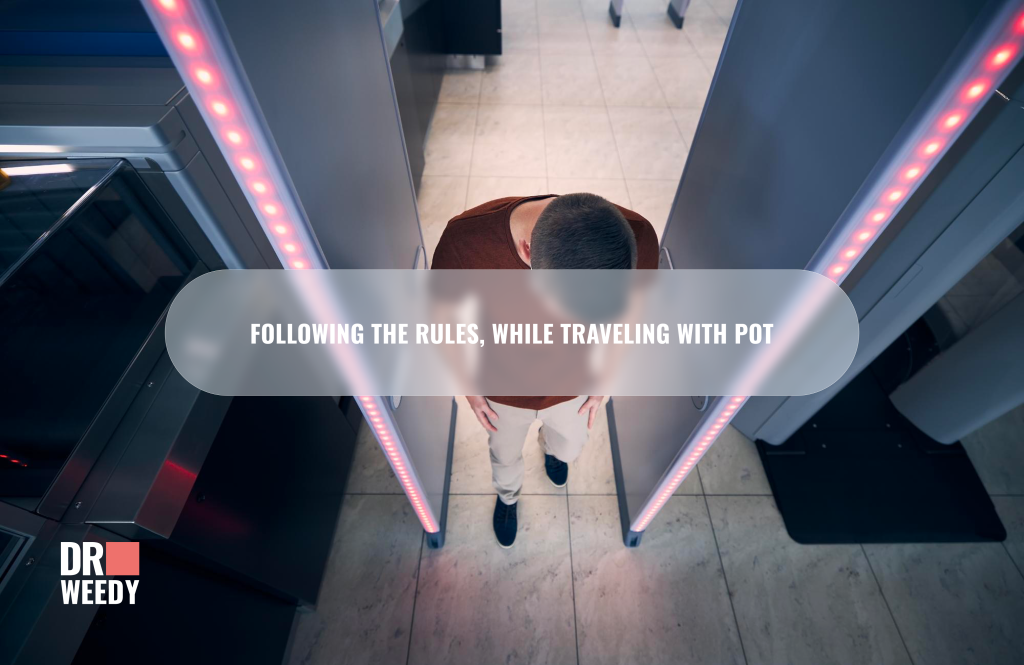
Having a marijuana card with you can also help as medical patients are typically treated a little more leniently than somebody else. But as TSA doesn’t have the jurisdiction or ability to check the validity of the cards, you can still be passed off to the local police. And of course, be aware that if the state has no medical-marijuana program, your mmj card won’t be your trump card. So the best advice for weed users planning to fly or travel with an airplane is to carry a medical marijuana card and get acquainted with state and airport rules. Suppose the airport is located in a state where cannabis has been legalized, and you have an acceptable quantity. In that case, it will most likely be handed back to you.
But for 100% confidence that your flight will be without delays and unnecessary difficulties, experts offer advice for the best course of action: If flying, better leave the marijuana at home.
Can you have weed in the car?
This is a tricky question, but don’t worry; we will answer it. For starters, it is considered illegal and perhaps not a wise choice to drive in your car under the influence of marijuana. It not only endangers your life, but you risk severe penalties if caught. A general rule for traveling with cannabis is to keep it in the trunk of your car, not in the front seat, opened. Moreover, it will do you a great deal of good to know the local laws in the state where you are driving because the rule differs from place to place. Here are the guidelines for California, Alaska, Colorado, Oregon, and Vermont:
- California
The California Vehicle Code 23222(b) is the state’s “open container” law, which makes it illegal to drive with any weed that is not in a container or that has been opened.
- Alaska
There is also an open container law, so it is safest to keep it in the trunk of your vehicle.
- Colorado
It gets a bit tougher in Colorado, where drivers with five nanograms of active THC in their blood can be punished for driving under the influence. Furthermore, the use of cannabis on any public road is forbidden. There is also an open container regulation, which makes it unlawful to have cannabis in a vehicle’s passenger compartment if it is in an open container, a container with a broken seal, or there is proof that cannabis has been used.
- Oregon
According to Oregon law (ORS 475B.245), a person 21 or older may transport up to one ounce of cannabis in a public place.
- Vermont
In Vermont, a person operating a vehicle on a public roadway is not permitted to possess cannabis in the passenger area of the car or any place readily accessible to the operator or passengers while in their seated positions, including the glove box. Violators face a $500 fine.
Can you travel across states with cannabis edibles?
Even if you are flying between two states where recreational cannabis is legal, by federal law you still can’t legally fly with edibles. But as mentioned before, THC gummies are not really a threat that the TSA is concerned with. So, ultimately, edibles are the easiest to fly with by far.
We won’t give you tips/life hacks on how to better hide your cannabis gummy bears in the luggage (you can google them yourself) but rather warn you that if spotted the edibles will be treated in accordance with local state rules, just like any other cannabis products.
So if you’re looking for ways to fly with marijuana edibles, you definitely need to be aware of possible risks and controversial situations with federal and local laws.
Can you fly with CBD?
Yes! You can carry your CBD product on a flight as long as it contains no more than 0.3 percent THC or is approved by the Food and Drug Administration (FDA). If the CBD product you carry is in liquid or food form, it must adhere to the TSA’s standard carry-on rules (3.4 ounces or less per liquid item, for example).
Safety Tips to Help You Travel Safely With Cannabis
Better leave cannabis at home, but if you take the risk:
- Carry no more than is permitted.
- It is preferable to keep it under one ounce.
- Keep it in your carry-on bag rather than your checked luggage.
- Keep the cannabis in the trunk of your automobile carefully.
- If you’re traveling somewhere where marijuana isn’t legal, don’t fly with it.
- Do not smoke in the vehicle.
What are the risks while traveling with marijuana?
As mentioned earlier, the consequences of traveling with marijuana might vary according to the fact of what state or country you’re heading to. Ordinarily, the risks range from having the weed taken from you, being questioned by the TSA and police, or paying a fine or a jail term. It’s an important reminder that despite the fact marijuana is legalized in your own state, you still might get imprisoned or charged criminally in another one because marijuana is recognized as a controlled substance and prohibited by federal laws.
Regarding flight, you should know that American Airlines considers it illegal to travel with weed edibles, even if it appears to be the safest way to fly. So always apply caution.
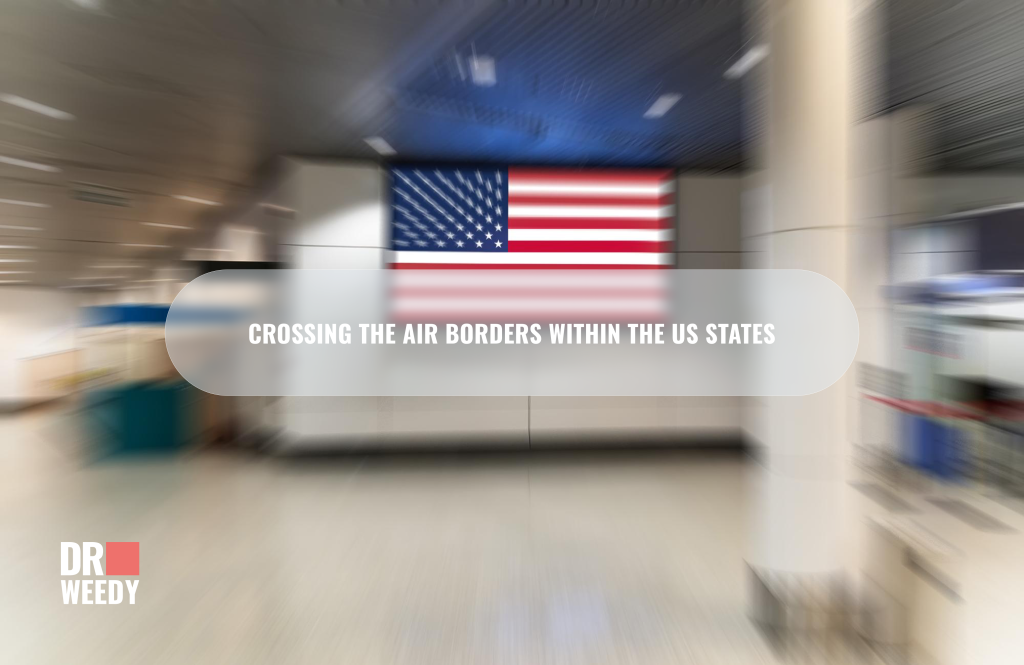
Conclusion
Information in power and safety. Traveling with marijuana is less problematic if you carry a permissible amount, possess your MMJ card, and are acquainted with the local laws of your destination state. Though still considered illegal in the eyes of federal law, state laws seem to matter the most. Therefore, you need to be aware of the local state laws to prevent unnecessary and unexpected issues while carrying your THC gummies and related products on vacation.
However, if you are stopped by TSA officials or local airport personnel or are charged, you may consult an attorney to discuss how to proceed and avoid such situations in the future. We wish you good luck and safe travels.

























